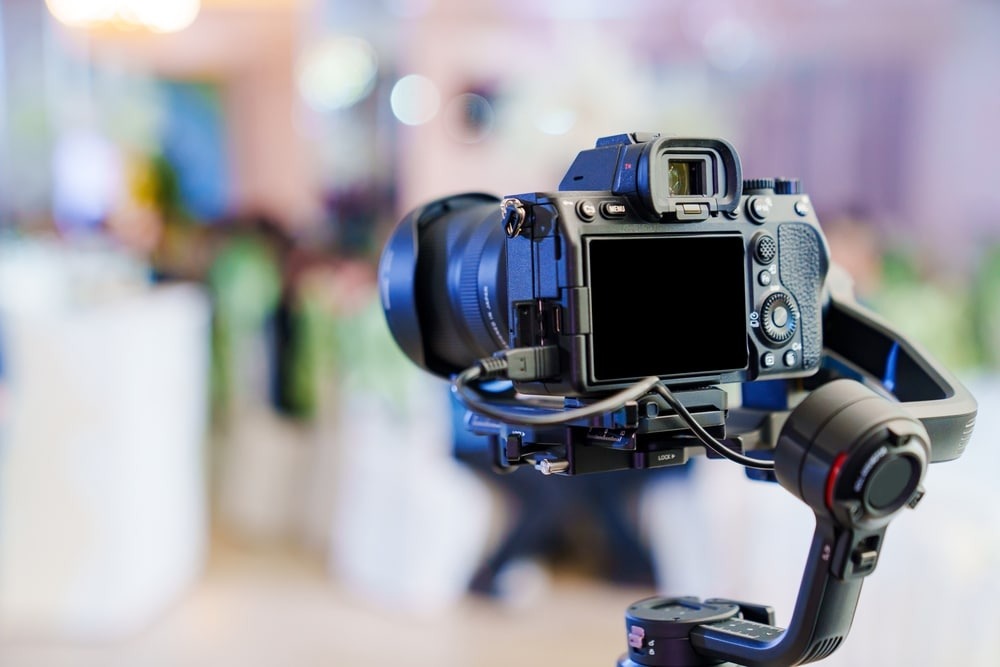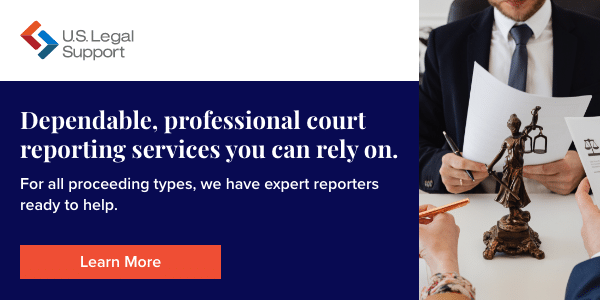Key Factors to Consider When Choosing a Legal Videographer

Knowing how to choose a legal videographer starts with learning exactly what they do and why their specific expertise is so important.
Beyond film quality and formatting needs, legal videographers must understand legal proceeding protocols and follow workflows and systems that guarantee file security and compliance.
Ultimately, choosing the right videography provider leads to evidence that holds up in court and risk avoidance for your firm.
What Does a Legal Videographer Do?
Videographers most often capture testimonies and depositions during the discovery phase of litigation. They can also be used at trial or engaged to record locations, machinery, event re-creations, and other useful videos for legal matters.
Legal videography can take place in conference rooms, hotels, courtrooms, homes, or any number of locations.
Capture Testimonies and Depositions on Video
Deposition and testimony videos record nuances that significantly affect the believability and interpretation of an individual’s spoken words. While transcripts are essential to the legal system, they don’t convey the full experience of witness testimony, especially given the varying types of witnesses.
Consider the difference between reading printed words vs. watching or hearing:
- Facial expressions that contradict or reinforce what is being said
- Fidgeting, tension, or body postures
- Tone and cadence changes
- Willingness or failure to make eye contact
With a video, a judge, jury, and other viewers can more clearly:
- Assess truthfulness
- Absorb the emotion involved
- Receive the full impact of injuries or harm described
Ensure Admissibility Through Professional Standards
There are some critical rules to abide by for videos that may be introduced at trial. Video depositions, for example, must follow Rule 30, Depositions by Oral Examination, under the Federal Rules of Civil Procedure. This covers1:
- Video manipulation – The “deponent’s and attorneys’ appearance or demeanor must not be distorted through recording techniques” which means no filters, creative filming techniques, or post-production manipulation to a straightforward video capture.
- Court reporter opening – A deposition video must begin with all required elements of the court reporter’s opening statement, including their name and business address; the deposition’s location, date, and start time; the deponent’s name and the administration of the oath or affirmation to them; and the identification and role of each person present.
- Court reporter closing – The videographer should continue uninterrupted filming through the court reporter’s closing, which includes the ending date and time, the custody and availability plans and stipulations of the video file, and any attorney or jurisdictional stipulations related to evidentiary exhibits, etc.
Skilled legal videographers will display professionalism through these behaviors:
- Arrive early with the right equipment for the space
- Handle all technical details and video equipment
- Capture all pertinent filming unobtrusively, without affecting the proceedings
- Offer rapid turnaround and choice of file format
Offer Postproduction Services
In addition to a “raw” video of legal proceedings, there are several ways that video files may need to be further adapted or used. When you choose a legal videographer, ask whether they (or their agency) can provide post-production services, such as:
- Video encoding, transcoding, conversion, and archiving
- Synchronization of separately recorded audio and video
- Video editing
- Video clip creation
- Closed captioning services
- Synchronized video transcripts
- Picture in picture (PIP) technology
Core Qualifications to Look for in a Legal Videographer
Proven experience should be a top priority when securing legal videography. Additionally, there are several educational and professional markers to consider. In particular, look for:
Certification
There is no required federal, state, or local certification, licensing, or registration for legal videographers.
However, certifications from professional associations can assure of competency through a combination of coursework, practical training, exams, and continuing education2,3:
- NCRA Certified Legal Video Specialist (CLVS)
- AGCV Certified Deposition Video Specialist (CDVS)
- AGCV Certified Evidentiary Video Specialist (CEVS)
- AGCV Certified Trial Technology Specialist (CTTS)
Industry Experience
Look for specific experience in legal videography—not simply the technical skills to handle the equipment. Legal videographers need to be familiar with regulations that govern their jurisdiction(s) and the unique goals and best practices of videos used in legal proceedings.
In some states, legal videographers of depositions or other official proceedings must be authorized to administer an oath to allow the video into evidence. This means holding credentials such as those obtained by:
- Court reporters
- Notary publics
- Court clerks and deputy clerks
- Bailiffs
Additionally, you may want to look for a legal videographer or agency that offers overlapping skills. A legal videographer who can also act as a trial presentation specialist or court reporter can land you a major efficiency bonus.
Familiarity with Courtroom Procedures and Legal Protocols
From adapting files for multi-platform use in hybrid trials to opting for best-practice equipment such as cardioid directional microphones, your videographer should understand the practical needs and requirements of the legal industry.
These include:
- Set up to capture all relevant parties by both sound and sight
- The who, when, and where of courtroom access, scheduling, and connectivity
- Techniques to remain unobtrusive and avoid distracting the court
- A basic understanding of hearing, deposition, and trial sequences and protocols
Technology and Equipment Considerations
Legal videographers need to select optimal equipment and software, anticipating what they’ll rely on in different environments. This includes considering:
- Lighting, acoustic, and filming setup challenges
- Technology choices common to law firms and their conference rooms
- Built-in equipment in courthouses and courtrooms
- Best practices for capturing low-volume, multi-directional, multi-speaker audio
- Connectivity and power access workarounds
Audio and Video Quality Standards for Legal Use
The goal of legal videography isn’t a cinematic masterpiece, but a clear record that captures all sounds and sights as crisply and truly as possible. There may be jurisdictional or administrative requirements around file specs such as format and size, but the requisite qualities of filming under Federal Rule of Civil Procedure 30 and Federal Rule of Evidence 902 are1,3:
- No distortion of appearance or demeanor through recording techniques
- Proof of original, unmanipulated file including intact metadata
- Inclusion of all elements of the court reporter’s opening and closing statements
Backup Systems and File Security Measures
A file gone missing or into the wrong hands can lead to delays or liability risks. To that end, your videographer needs to understand and utilize systems and protocols that provide security and backup for your files. This includes:
- Redundant datacenters
- 24/7 network and security operations
- End-to-end encryption
You can check on their security protocols by inquiring about independent audits and their adherence to the following:
- SOC 2 Type 2 security compliance
- NIST Cybersecurity Framework
- HIPAA compliance
Legal and Ethical Compliance Requirements
During a trial, video can serve critical functions and offer a make-or-break impact on case outcomes.
Functionally, legal videos can be used:
- As leverage during settlement negotiations
- To support pretrial preparation and strategy
- In lieu of live testimony at court
- To impeach witnesses during a trial
Understanding of Confidentiality and Chain of Custody
The content of legal videos can impact lives, marriages, employment, and even pose wider business and political risks. This makes confidentiality essential for all stages of capturing, storing, transferring, and (refraining from) discussing videos. Even for videos destined to be shown at trial and become part of the public record, timing and certainty of that release can alter case outcomes, making confidentiality a must.
To be useful as evidence, legal videos also need to have a watertight provenance. The original file must be protected, with intact metadata that displays provenance factors including3:
- Authorship
- Creation and modification time-stamps
- Digital signatures
Compliance with Local Jurisdictional Rules
The Federal Rules of Civil Procedure and Evidence were mentioned above, but they aren’t used across the board. While most states have adopted them to a large degree, there are variances that may impact how videos are taken and what elements must be included or proven.
Your legal videographer should understand the evidentiary guidelines for the specific jurisdiction to avoid having video discarded from your evidence lineup at trial.
Final Thoughts: Choosing the Right Legal Videographer with Confidence
Selecting the right legal videographer means understanding what questions to ask to ensure you’re not just getting someone with the right technical and creative skills. Find out the details of their experience, legal understanding, and security workflows to produce, protect, and deliver exactly what you need.
Since 1996, U.S. Legal Support has been the leading provider of top-notch litigation support services, including legal videography and video deposition services.
We can connect you with our nationwide team of professional legal videographers who are backed by an in-house team of experienced production professionals. We create thousands of videos every year supporting attorneys, law firms, and other organizations.
Plus, vetting U.S. Legal Support can lead you to a one-stop shop for a wide range of litigation support services. These include court reporting, transcription, interpreting, records retrieval and analysis, and trial services, including voir dire consultancy, jury research and consulting, mock trials, witness preparation, trial graphics, demonstratives, and trial presentation and technology services.
U.S. Legal Support can handle any legal video job, anywhere, anytime. If video is part of your discovery process or trial strategy, reach out today to connect with us.
Sources:
- Cornell Law School. Rule 30. Depositions by Oral Examination. https://www.law.cornell.edu/rules/frcp/rule_30
- National Court Reporters Association. Certified Legal Video Specialist (CLVS). https://www.ncra.org/certification/NCRA-Certifications/certified-legal-video-specialist
- American Guild of Court Videographers. AGCV CERTIFICATIONS. https://www.agcv.com/certification
National Court Rules Committee: Federal Rules of Civil Procedure. Rule 902 – Evidence That Is Self-Authenticating. https://www.rulesofevidence.org/fre/article-ix/rule-902/

Editoral Policy
Content published on the U.S. Legal Support blog is reviewed by professionals in the legal and litigation support services field to help ensure accurate information. The information provided in this blog is for informational purposes only and should not be construed as legal advice for attorneys or clients.


